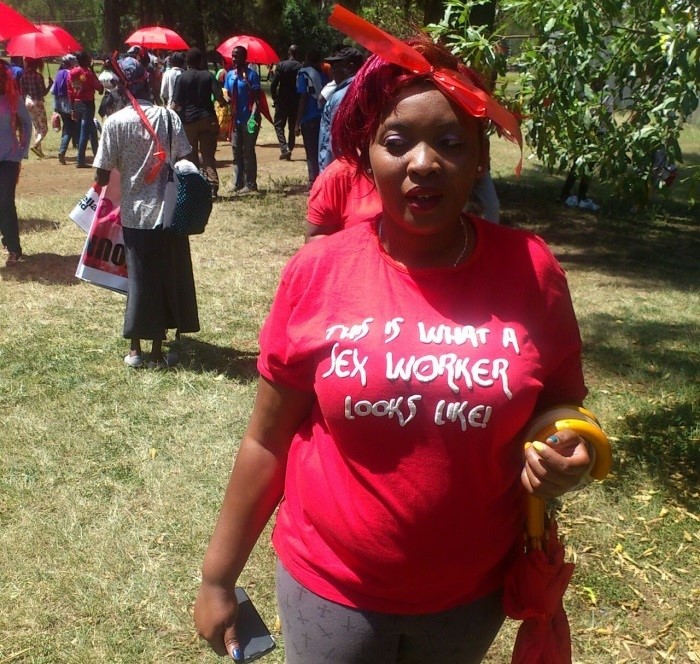Written by Mary Mwangi, Sex Worker
My name is Mary Mwangi, and I am an experienced and proud sex worker operating in the capital city of Nairobi. I was introduced to sex work by a friend at a very tender age. Naïve and without much knowledge about protection, I got pregnant. My mother, a single mom with no stable income, could not support my child and me. Therefore, I had no choice but to engage in sex work.
During my sex work career, I encountered a lot of human-rights violations from both clients and the police. It was so hard to sail through, but the only way for survival was to become strong. I am a strong woman. I have been beaten up by clients and police, illegally arrested, and raped by police and county askaris (city police).

Mary Mwangi during International Day to End Violence against Sex Workers.
Later, I was trained by The Bar Hostess Empowerment and Support Program (BHESP), as a peer educator. Through this work, I reach my peers with information on HIV prevention, distribute condoms, and advocate for their rights. I met people from BHESP when they were doing they field work, and I was interested because they told me they were supporting sex workers and bar hostesses. They offered free condoms, HIV testing, and counseling; they were very friendly and ready to listen and assist. They also offered treatment for STIs, so I knew they were there to support us.
Because of my passion, determination, and hard work, BHESP trained and employed me as an HIV prevention advocacy and human rights officer. My major roles are to coordinate paralegals, identify cases of human rights violations, and pursue those cases in court. I also spend a lot of time sensitizing sex workers about their rights. I am the local resource person who provides legal advice to my fellow sex workers; they always appreciate hearing about what I have gone through. The cases that I have handled—including murder, rape, assault, and illegal arrest—were promptly addressed.
I also work as a bridge between sex workers, law enforcers, and organizations. I intervene on health issues and provide referrals on gender-based violence. I also represent the organization (BHESP) in court and at police stations as needed, and distribute condoms to sex workers in lodges, bars, and guest houses. I submit a monthly report to the director of BHESP to help identify sex workers’ needs and the challenges they are facing in different parts of the country. I get a small payment for this work, but I still do my sex work.
Being a sex worker in Kenya is not for the faint of heart, because sex work is illegal. At times I face a lot of stigma, discrimination, and violence (physical abuse, emotional abuse, sexual abuse, illegal arrest, or attempted murder) from our clients, police, family, society, and the community.
Because of stigma in the community, sex workers need friendly health services and health facilities. We also need to teach sex workers about human rights and how the constitution sides with us as a community.
